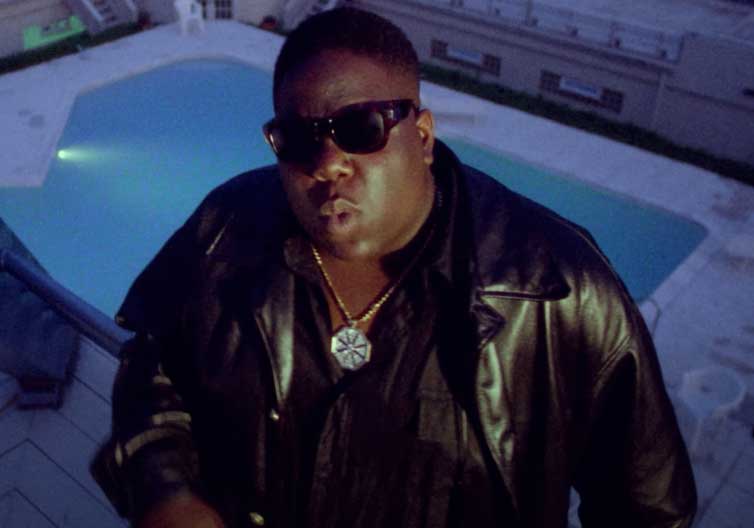The story of Christopher Wallace, aka The Notorious B.I.G., and his massive hip-hop joint Juicy begins in 1983, with Mtume’s saucy boogie classic Juicy Fruit, whose sparse percussion, thick bass and evocative riff were sampled to provide the backbone to the Brooklyn-born rapper’s career-making hit.
The kind of star needed to break through
Mtume’s record had been remade by Wrecks-N-Effect as Juicy in 1989, in the then cutting-edge New Jack Swing style, as the group combined raps with contemporary R&B. Wrecks-N-Effect member Markell Riley was the brother of New Jack Swing lynchpin Teddy Riley, who also worked on the record, and whose own group Guy were signed to the late Andre Harrell’s New York City-based Uptown Records, one of whose emerging production talents was the future “Puff Daddy”, Sean Combs. Breaking away to form his own Bad Boy Entertainment company in 1993, Combs soon launched a two-pronged assault on the hip-hop world, courtesy of Craig Mack’s monster cut Flava In Ya Ear and a rapper who would soon be hailed as one of the greatest of all time.
Just as commonly known to hip-hop fans as Biggie Smalls, Wallace was lured away from Uptown with the promise of dollar signs. Capable of handling the hardest of hardcore rap tracks (Warning, Who Shot Ya; Junior M.A.F.I.A.’s Player’s Anthem) alongside gangsta-loverman fare (compare the luscious, DeBarge-sampling single mix of One More Chance with the neck-breaking, Lou Donaldson-biting Hip Hop Remix), Biggie’s raw talent gave Bad Boy the kind of star it needed to break through.
Righteously unapologetic
His introduction to the wider world, however, was Juicy. Using the Mtume sample to evoke nostalgia, and with Combs interjecting as hypeman, The Notorious B.I.G. takes listeners back to both his childhood and a teenage life in crime. “It was all a dream”, he says of his newfound rap career. “I used to read Word Up! magazine/Salt-N-Pepa and Heavy D up in the limousine.”
Offering shout-outs to 80s rap icons such as Mr Magic, Marley Marl and Lovebug Starski, Biggie also dedicated the song “To all the people that lived above the buildings that I was hustlin’ in front of/Called the police on me when I was just tryin’ to make some money to feed my daughter”. From the off, then, Juicy was perfectly set up to appeal to his hometown crowd while also offering glimpses of an edgy way of life many listeners would never experience.
Wallace’s immense rapping skills were already evident, with lines such as “Now honeys play me close like butter play toast” and “I let my tape rock ’til my tape popped” revealing his skills with similes and internal rhymes. Meanwhile, Mtume’s come-on chorus was repurposed by R&B group Total into an aspirational homily about getting out of the ghetto, and Biggie packs the rhymes in because – not as if – his life depended on it: “Born sinner, the opposite of a winner/Remember when I used to eat sardines for dinner”.
On the verge of being hailed as one of the greatest hip-hop stars of all time, Biggie himself seems shocked by his own progression. “I made the change from a common thief/To up close and personal with Robin Leach,” he says, and relates his own issues to wider social trends: “Stereotypes of a Black male misunderstood”. Like those who would follow (Jay-Z, Kanye West), Wallace’s success also made him a righteously unapologetic consumer: “Damn right, I like the life I live/’Cause I went from negative to positive”.
Accolades by the cartload
Released as a single on 9 August 1994, a slightly tougher version of Juicy was helmed by go-to 90s hip-hop producer Pete Rock, while the single also included the excellent Unbelievable, produced by Gang Starr’s genius mastermind DJ Premier, as a B-side. Clearly, the biggest talents in New York were already flocking to Wallace’s door. Two of the best Notorious B.I.G songs of all time, both Juicy and Unbelievable become part of his superb debut album, Ready To Die, while the Juicy video retraced his journey from street-corner police arrests and prison to happier times at a pool party and with his family. Accolades followed by the cartload.
If only things could have stayed that way. Wallace’s disputes with his West Coast rivals are the stuff of lurid legend. Murdered in 1997, just as his epic second album (prophetically named Life After Death) was about to be released, his death was a senseless, tragic loss not only to the hip-hop world, but to music as a whole. Considering how hard he had worked to escape the stereotypes he sang of, Biggie’s fate makes Juicy all the more poignant. It is not too much, however, to suggest that his reputation – cemented by no shortage of tributes from generations of rappers that followed – is not dissimilar to that of another troubled legend of Black music, blues pioneer Robert Johnson. Both mercurial talents taken away too young, and in disputed circumstances, they put renewed fire in the belly of a pre-existing style. That’s no dream.
Check out our best Notorious B.I.G. songs to find out if Juicy still has the juice.
More Like This
Vogue: The Story Behind Madonna’s Most Celebrated Video
As iconic as it gets, the promo video for Madonna’s Vogue single proved that the “Queen Of Pop” was all about making high art.
What’s Love Got To Do With It: Behind Tina Turner’s Universally Adored Anthem
A true 80s mega-hit, What’s Love Got To Do With It defined Tina Turner’s career, if not her outlook on life…
Be the first to know
Stay up-to-date with the latest music news, new releases, special offers and other discounts!




